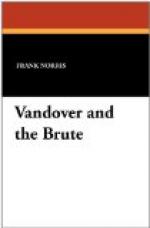He sat on the outside of the car, wondering if any one he knew would see him, half hoping that such a thing might happen, realizing the dramatic interest that would centre about him now in his present condition as a survivor of a wreck. The idea soon attracted him immensely and he began to look out for any possible acquaintance as the car began to climb over Nob Hill.
At the crossing of Polk Street he saw Ida Wade’s mother in deep mourning, standing near a grocery store holding a little pink parcel.
It was like a blow between the eyes. Vandover caught his breath and started violently, feeling again for an instant the cold grip of the hysterical terror that had so nearly overcome him on the morning after Ida’s death. It slowly relaxed, however, and by the time he had reached the house on California Street he was almost himself again.
It was about church time when Vandover arrived at home once more. There was a Sunday quiet in the air. The bells were ringing, and here and there family groups on their way to church, the children walking in front, very sedate in their best clothes, carrying the prayer-books carefully, by special privilege.
The butler was working in the garden, as he sometimes did of a Sunday morning, pottering about a certain bed of sweet-peas, and it was the housekeeper who answered his ring. She recognized him with a prolonged exclamation, raising her hands to heaven.
“O-oh, and is it you, Mr. Vandover, sir? Ah, how we’ve been upset about you and all, and it’s glad to see you back again your father will be! Oh, such times as we had when we heard about the wreck and knowing you were on it! Yes, sir, your father’s pretty well, though he was main poorly yesterday morning. But he’s better now. You’ll find him in the smoking-room now, sir.”
Vandover pushed open the door of the smoking-room quietly. His father was sitting unoccupied in the huge leather chair before the fireplace. He was dead, and must have died some considerable time before, as he was already cold. He could have suffered no pain, hardly a muscle had moved, and his attitude was quite natural, the legs crossed, the right hand holding the morning’s paper. However, as soon as Vandover touched the body it collapsed and slid down into a heap in the depth of the chair, the jaw dropping open, the head rolling sidewise upon his shoulder.
Vandover ran out into the hall, waving his arms, shouting for the servants. “Oh, why didn’t you tell me?” he cried to the housekeeper “Why did you let me find him so? When did he die?” The housekeeper was distraught. She couldn’t believe it. Only a little while ago he had called her to say there were no more matches in the little brass matchsafe. She began to utter long cries and lamentations like a hen in distress, raising her hands to heaven. All at once they heard some one rushing up the stairs. It was the butler, in his shirt-sleeves and his enormous apron of ticking, still carrying his trowel in his hand. He was bewildered, his eyes protruding, while all about him he spread the smell of fresh earth. At every instant he exclaimed:




